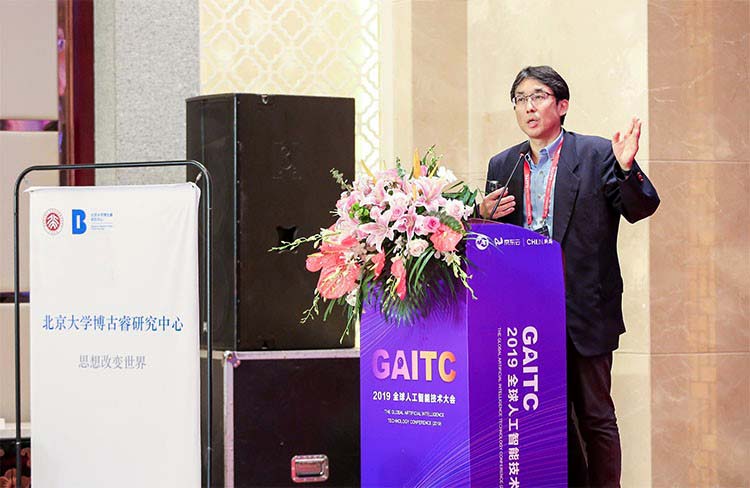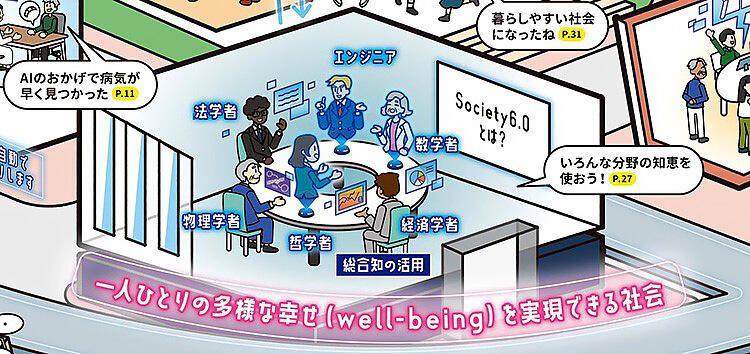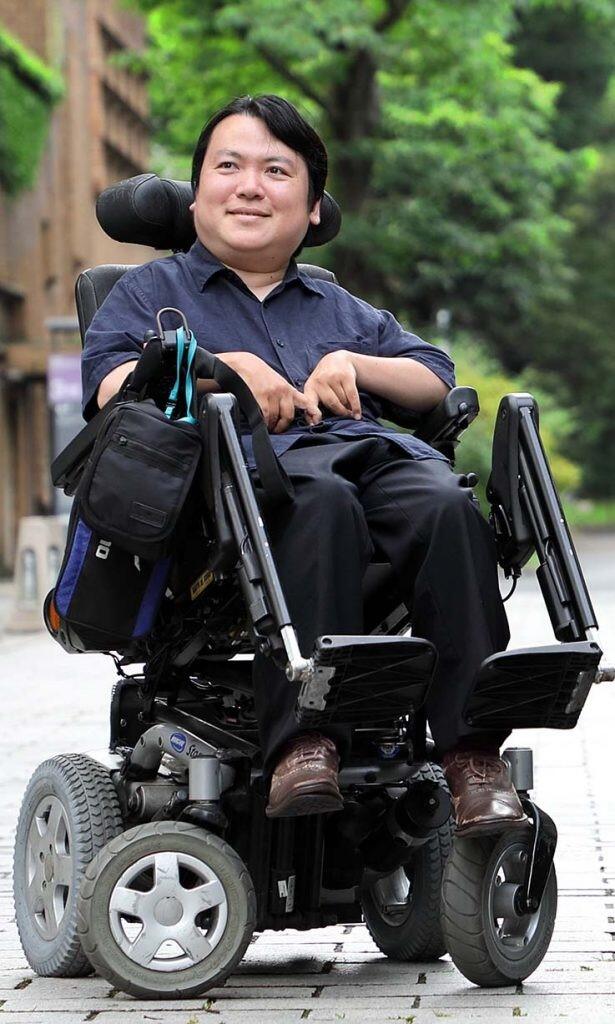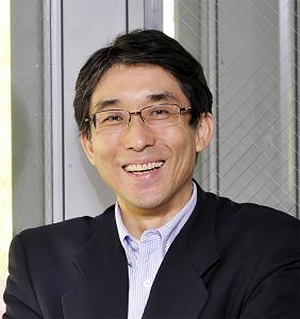
"The 2021 edition of the White Paper on Science, Technology and Innovation" states that to realize "the overall well-being of each individual," it is important to utilize convergence of 'knowledge' that integrates the 'knowledge' of the natural sciences with the 'knowledge' of the humanities and social sciences. We asked Osamu Sakura, Professor of the Interfaculty Initiative in Information Studies at the University of Tokyo, who specializes in the relationship between science and technology and society, why convergence of knowledge is needed now and what it means to all of us.
Anxiety about the autonomous evolution of science and technology
Sakura explains the historical background of the idea of convergence of knowledge. "Originally, technology progressed in response to the need to travel further or help us to make things more easily. Today, however, diverse values make it difficult to think of technology as having a single purpose. And an increasing amount of new science and technology has been produced without a specific purpose."
"Artificial intelligence (AI) and robots are typical examples of this. Science and technology have developed autonomously in a way that they can do 'such and such' a thing. When they are introduced to the world, it is unclear what kind of problem they will solve or what result they will bring, which sometimes amplifies anxiety around the technology. In addition to the diversification of values, the need to address these things and think about the use of technology and its value to society ― I think this is why we need 'convergence of knowledge,'" Sakura goes on.
According to Sakura, historically speaking, scientists stopped discussing happiness around the start of the latter half of the 20th century. The twisted link between state policy and science and technology has resulted in numerous sacrifices, including the tragedy of the World War II era. Prioritizing the values of the whole society can lead to individual unhappiness.
"Science has no say in happiness; the realms of morality, philosophy, and religion should be separated from the realm of science ― the trend of not stepping on each other's toes arose. Of course, scientists need to be cautious when discussing happiness and value. Still, scientists should be a little more aware of what they can say about human happiness as scientists in this day and age. On the other hand, philosophy and religion also need to use the results of science actively to add to their own value. I think that will lead to the convergence of knowledge," says Sakura.
"Crossing the Border of Humanities and Sciences" and "Editing Knowledge" is necessary
Creating and utilizing "convergence of knowledge," which is the combination of natural science "knowledge" and humanity and social science "knowledge" ― What do you imagine when you hear this? You may imagine researchers in the natural sciences and the humanities and social sciences are discussing and collaborating to solve social issues while building new academic disciplines to create a better society. However, Sakura says that this is not so easy.

(Source: "2021 White Paper on Science, Technology and Innovation," provided by MEXT, the Ministry of Education, Culture, Sports, Science and Technology)
As their research progresses and their expertise deepens, the scope of what researchers cover becomes narrower and more profound and it becomes more difficult for them to connect their research with that of other fields. In addition, the underlying values of each academic area and research method are different. "1+1 may make only 1.2 or even 0.8 when two disciplines with respective accumulated experiences are fused. We use the term 'cross-border' instead of fusion in this regard. It is necessary to cross borders based on one's academic discipline and join hands with people from different fields to bridge the gap where necessary, or to 'edit your knowledge' so to speak."
Sakura points out that respecting other disciplines is vital to cross borders, in addition to the ability to let go of one's field of study a bit and look at it objectively from a higher perspective. "I think this is the same attitude that is required in 'cross-cultural communication.' If you exclude people just because they have different religions or food habits, communication will be difficult. Making an effort to understand different backgrounds of research methods and values depending on academic fields is what is means to show respect."
Shouldn't Forget Perspectives of Ordinary Citizens
While "convergence of knowledge" is a combined knowledge of the natural sciences, humanities, and social sciences, Sakura points out that we should not forget the perspectives of ordinary citizens who use science and technology. There is a vast amount of knowledge from experience accumulated in our daily lives. With a bit of scientific knowledge and ingenuity added, life can become very convenient and rich. We will need to look at the relationship between knowledge in daily life, knowledge from life or experience, and specialized knowledge, including science and technology. As an example, he introduced a story he heard from a care worker who became a licensed physical therapist.
"In the field of nursing care, there are various procedures to take based on experience, for example, taking a resident to the bathroom after breakfast. The aforementioned care worker said through learning the physiology of human bodies in practice, it was eye opening that all the experiential knowledge accumulated in the field was based on universal principles." In short, "physiology researchers don't know anything about the nursing care field and care workers are working based on knowledge from experience instead of physiology; there is nothing to connect them. The same thing is happening everywhere in our daily lives, not just in the nursing home."
Sakura says that there is a need to have a process to translate specialized knowledge into living knowledge. And that is where we need to create a place and atmosphere so that ordinary citizens can be more involved.
Pioneering "Tohjisha-Kenkyu" (participant driven research)
So what should ordinary citizens keep in mind?
"Rather than having the idea that you must first learn technology, you think about what technology and knowledge can be useful to enrich and develop your life and values as a central idea. I want people to have the perspective that it is ordinary citizens who are the core users of science and technology," says Sakura.

(Provided by Kumagaya).
Sakura cites "Tohjisha-Kenkyu", or participant driven research when translated to English, as a typical example of how ordinary citizens approach science and technology from what science and technology are necessary for them. Tohjisha-Kenkyu began when a person with a mental illness tried various ineffective treatments and began his research in conversation with a social worker confusedly. It uses scientific knowledge as a foothold, and the participants speak in their own words as a way to fill the gap between medical terms, diagnoses and their own senses. This research, which thinks about, and practices how to interpret and deal with the participants situation, is spreading to sites where people suffer from various problems and inconveniences. The academic world has also begun to pay attention to it. The University of Tokyo's Research Center for Advanced Science and Technology has established a research laboratory for the field of Tohjisha-Kenkyu.
"There are many different aspects to Tohjisha-Kenkyu, but I think it is a significant pioneering movement when we think about the relationship between science and technology and everyday life in the future." Sakura thinks we are currently lacking in the seeds that lead to the discovery of science and technology and research themes in everyday life. Still, the seeds that drive science and technology should emerge from our daily lives.
He wants to tell the younger generation that their lives and their interests can be the seeds of science. "It doesn't matter if it's a game, music, or anything else. There will always be a seed of science or technology there. If you take a step forward into the world where you can act on your curiosity, you will find a hook that leads to science. The accumulation of small discoveries brought by encounters with knowledge of science and technology will lead to a fulfilling life and well-being."

SAKURA Osamu
Professor, Interfaculty Initiative in Information Studies, The University of Tokyo; Team Leader, RIKEN Center for Advanced Intelligence Project (AIP)
He earned a Ph.D. in 1990 from the Graduate School of Science, Kyoto University. After working as a postdoctral felllow at Mitsubishi Kasei Institute of Life Sciences, an associate professor at the Faculty of Business Administration, Yokohama National University, a visiting researcher at the Institute of Computer Science and Social Studies, Albert-Ludwigs-Universität Freiburg, Germany, and an associate professor at the Interfaculty Initiative in Information Studies, the University of Tokyo, he assumed his current position in 2007. His main research theme is the study of science, technology and society.
Original article was provided by the Science Portal and has been translated by Science Japan.




